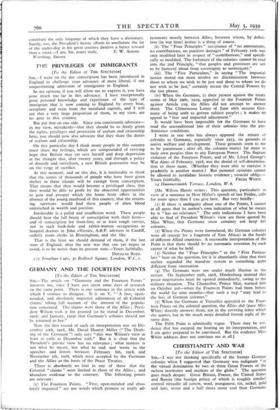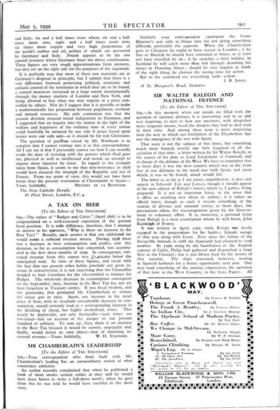CHRISTIANITY AND WAR
[To the Editor of THE SPECTATOR] SIR,—I was not thinking specifically of the former German colonies when I suggested that Germany was indignant " at the virtual domination by two or three Great Powers of the richest territories and markets of the globe." The question goes much deeper. Great Britain, France, the United States and Russia (the foreign policy of which is roughly similar) control virtually all cotton, wool, manganese, tin, nickel, gold and jute, seven and a half times more coal than Germany and Italy, six and a half times more wheat, six and a half times more zinc, eight and a half times more iron, six times more copper and very high proportions of the world's rubber and oil, neither of which are possessed by Germany and Italy. Potash appears to be the one natural resource where Germany beats the above combination. These figures are very rough approximations from memory, but they err on the right side for the purposes of the argument.
It is perfectly true that most of these raw materials are at Germany's disposal in principle, but I submit that there is a vast difference between possessing political, economic and cultural control of the territories in which they are to be found, a control moreover exercised to a large extent internationally through the money markets of London and New York, and being allowed to buy what one may require at a price con- trolled by others. Nor do I suggest that it is possible to make a mathematically fair proportion between population, territory and natural resources. My only contention was that the present division aroused moral indignation in Germany, and I suggested that an inquiry into the matter in the light of the welfare and happiness of the ordinary man of every nation could fruitfully be initiated by our side if peace based upon justice were our only aim—as it should be for real Christians.
The question of pacifism raised by Mr. Northcott is so complex that I cannot venture into it in this correspondence. All I can say is that I personally cannot see how I can morally evade the duty of resisting with the powers which God gave me, physical as well as intellectual and moral, an attempt to impose sheer injustice by force. In regard to the example taken from Spain, it seems to me that non-resistance in 1936 would have ensured the triumph of the Republic and not of Franco. From my point of view, this would not have been better than the present restoration of Christianity to Spain.—
67 Fleet Street, London, E.G. 4.















































 Previous page
Previous page